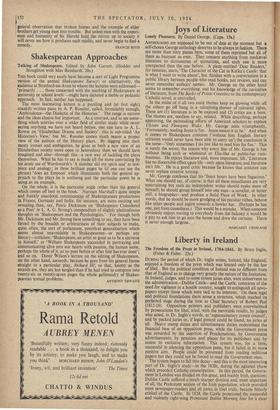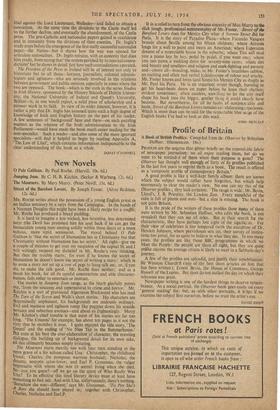Liberty in Ireland
The Freedom of the Press in Ireland, 1784-1841. By Brian Inglis. (Faber & Faber. 25s.) The Freedom of the Press in Ireland, 1784-1841. By Brian Inglis. (Faber & Faber. 25s.) DURING the period of which Dr. Inglis writes, Ireland, like England, enjoyed a freedom of the 'press which was limited only by the law of libel. But the political condition of Ireland was so different from that of England as to change very greatly the nature of the limitation. In Ireland, judges, and to some extent juries also, were subservient to the administration—Dublin Castle—and the Castle, conscious of the need for vigilance in a hostile country, sought to extinguish all news- papers except those which were tied to its interests. On these legal and political foundations there arose a structure, which reached its rfected stage during the time as Chief Secretary of Robert Peel pe (1812-18). Opposition printers and publishers were, overwhelmed by prosecutions for libel, tried, with the inevitable results, by judges who acted, in Dr. Inglis's words, as 'supernumerary crown counsel', and by packed juries or, if legal pretext could be found, no juries at all. Heavy stamp duties and advertisement duties undermined the financial base of an opposition press, while the Government press was rewarded by the insertion of Proclamations, by Government advertisements, by pensions and places for its publishers and by access to exclusive information. This system was, for a time, successful in silencing the opposition press, but it failed in its more positive aim. People could be prevented from reading seditious papers but they could not be forced to read the Government ones.
The system began to fall into decay—and this is the most interesting part of Dr. Inglis's study—in the 1820s, during the agitated phase which preceded Catholic emancipation. In this period, the Govern- ment in London was divided on this great, and mainly Irish, question; Dublin Castle suffered a much sharper division and, most important of all, the Protestant section of the Irish population, which provided most newspaper-readers and all juries in libel trials, became bitterly critical of the Castle. In 1824, the Castle prosecuted the successful and violently right-wing Protestant Dublin Morning Star for 'a clear
libel against the Lord Lieutenant, Wellesley—and failed to obtain a conviction. At the same time the divisions in the Castle itself led to the further decline, and eventually the abandonment, of the Castle press. The pro-Catholic and nationalist papers gained in confidence and in immunity from the divisions of their enemies. Dr. Inglis's study stops before the emergence of the first really successful nationalist paper—the Nation—but it shows how the way was opened for articulate nationalism. Dr. Inglis refrains, with an austerity that does him credit, from saying that' the system perished by its internal contra- dictions' but he shows in detail just how such contradictions operated.
The Freedom of the Press in Ireland will be of interest not only to
w historians but to all those—lawyers, journalists, colonial adminis- trators and agitators—who are seriously involved in the relations between government and public opinion, especially in zones where the two are opposed. The book—which is the sixth in the series Studies in Irish History, sponsored by the History Schools of Dublin Univer- sity, the National University of Ireland and Queen's University, Belfast—is, as one would expect, a solid piece of scholarship and a pioneer work in its field. In view of its wider interest, however, it is rather a pity that Dr. Inglis has assumed quite such a high degree of knowledge of Irish and English history on the part of his reader. A few sentences of 'background' here and there—on such puzzling matters as the relation of the Irish administration to the Irish Parliament—would have made the book much easier reading for the non-specialist. Such a reader—and-also some of the more ignorant specialists—will find it helpful to begin by reading Appendix A, ' The_Law of Libel', which contains information indispensable to the clear understanding of the book as a whole.
DONAT O'DONNELL



































 Previous page
Previous page